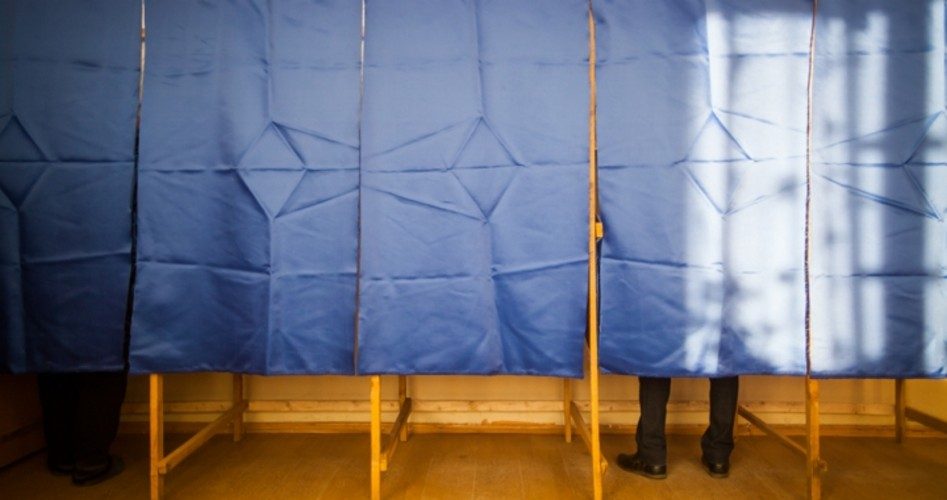
Legislation that would fine individuals who fail to vote has been introduced into the New York State Assembly by Democrat Deborah Glick, who explained that her bill’s purpose is primarily to increase voter turnout.
“Mandatory voting would drastically increase civic participation and transform the political arena by making politicians more reflective of the constituents that elected them,” Glick wrote in a memo.
Although Glick’s proposed fine for those who do not vote and fail to provide a “valid excuse” is just $10, the principle that would be established by such a law is significant. It is yet another indication that some believe there are few, if any, limitations on the power of the state to force citizens to bend to their will.
Senator Fred Akshar, the Republican chairman of New York State’s Senate Elections Committee, said as much, calling the bill unconstitutional. “Last time I checked,” he asserted, “this was the United States of America and people have a right to vote or not to vote.” (Emphasis added.)
Lest one dismiss Glick’s proposal as just the harebrained idea of an obscure legislator in only one American state, two things must be considered: (1) How many ideas have the American people seen implemented in the past few years, either through statute or judicial fiat, that would have been considered absolutely bizarre just a few decades ago; and (2) this idea has also been advanced by others — some much more prominent than Glick.
After the 2014 elections caused the Democratic Party to lose its majority in the U.S. Senate, President Obama endorsed the idea of mandatory voting. He complained that many who ordinarily turn out to vote Democrat in presidential elections do not do so in off-years (without an election for president). The number who tend to vote Republican for president also drops off in mid-term elections, but not as steeply as among Democrat voters.
“It would be transformative if everybody voted,” Obama told a town-hall in Cleveland, Ohio. “If everybody voted, then it would completely change the political map in this country.” No doubt.
It is safe to assume that many Democrats share Obama’s motivation for wanting everyone to vote. Many elections for U.S. House and Senate are determined by a relatively small number of votes.
In Switzerland, a study in Schaffhausen, the one canton (similar to a U.S. state) which uses such mandatory voting, found that it increased support for left-wing policy positions in referendums by as much as a staggering 20 percentage points.
Studies in the United States have also indicated that mandatory voting tends to favor more liberal party candidates by 2-3 percentage points. When one considers that such a swing would have elected Hillary Clinton rather than Donald Trump in the last presidential election, it becomes rather obvious what the motivation is for favoring forced voting by such Democrats as Glick and Obama.
Perhaps these facts can explain the inclusion of compulsory voting in the UN’s Universal Declaration of Human Rights as one of its so-called “duties to community.” Other such “duties” the UN document lists include payment of taxes, compulsory education, and military service.
More than 20 countries use compulsory voting, though it is not rigorously enforced in most. Among those which do enforce mandatory voting laws, the punishment usually involves small fines.
North Korea mandates that any person over age 17 must vote. The elections are meaningless, however, as only one candidate appears on the ballot. The voting nevertheless serves a purpose for the totalitarian government in power: It helps track its citizens.
Brazil punishes non-voters by making it illegal for them to obtain a passport. Bolivia suspends a person’s withdrawal of their salary from a bank for three months. In Greece, a non-voter can be denied government-provided goods and services.
While non-voting is not illegal presently anywhere in the United States, it is assumed by most Americans that large voter turnouts are positive. Media and even average Americans regularly lament over low turnouts on election day. Before the election, it is standard practice for local media to encourage all eligible voters to cast their ballots, insisting, “It doesn’t matter who you vote for, just so long as you vote.” Of course, this is nonsensical, since if it truly does not matter who one votes for, why would one need to vote at all? Rather, uninformed voters should be encouraged to become informed on the issues and candidates.
Voter turnout tends to be lower in the United States than in other countries which regularly hold elections. For one thing, as much as Big Government has grown in America over the past several years, fewer things are within the province of government than in most of the “welfare states” of Europe. In other words, how a person votes in European countries is understood to significantly affect one’s daily life.
The reason that people are ordinarily motivated to vote is because they believe their votes makes a difference in their lives. A large number of people do not vote, then, because they are simply apathetic. While the government does affect their life greatly, unless these non-voters are sufficiently informed to understand this, they simply will not go to the polls.
Of course, some are legally barred from voting. These are the disenfranchised, such as those convicted of felonies, or persons legally judged to be mentally incompetent or insane. However, these groups account for only a tiny percentage of non-voters.
Others do not vote because they cannot decide. Perhaps their family pushes them one way, while their peers at work advocate another way.
Some choose not to vote because they are alienated. They believe the system is rigged. It is not they do not think government greatly affects their life; they simply do not believe they can change anything with their vote. Some actually make a conscious decision not to vote as a form of protest against the system. In effect, their non-vote is a vote.
Closely related to this are those who do not vote because to do so would violate their religious beliefs. Examples would include the Jehovah’s Witnesses or the Christadelphians. While we might disagree with their theological position, in a free society, it is antithetical to liberty to force them or anyone else to vote.
Probably the main reason for non-voting in America is that these non-voters are satisfied. They don’t think their vote makes much of a difference, and in their mind, that is fine, because regardless of who wins the election, everything will turn out well. We may look at these folks as naïve — akin to those in Pompeii who didn’t realize that nearby Mount Vesuvius was about to erupt — but if a person is that grossly uninformed, of what value would their vote really be?
The truth is, until a person becomes informed enough to vote, it is better if he or she stays home. Those who believe in limited government and individual liberty should see these unformed people as a “mission field,” and inform them of the dangers of giving the government too much power, and the value of protecting individual liberty. Once these newly informed people have learned the dangers of Big Government, no one has to motivate them to go vote. They will not only vote, but do so much more intelligently.
Some in Australia, which has instituted compulsory voting, show up and write in names such as “Skippy the Bush Kangaroo.” Of what value is that person’s vote? Uninformed Americans who are forced to vote would look at a ballot and the names would be as meaningless as names selected at random out of a phone book.
It is a sad commentary that much of political advertising is aimed at the less-informed citizens who nevertheless are somehow convinced they have some “patriotic duty” to vote (even if they vote ignorantly). If we are aghast at the low level of such advertising, we must remember who is being targeted in these inane ads. It is not those who have read the U.S. Constitution and biographies of George Washington and Thomas Jefferson, and perhaps Frederic Bastiat’s The Law, but rather individuals who often cannot even name their own member of Congress.
If the proposal to force everyone to vote, as desired by Glick and Obama, were ever made law, we can only shudder at the thought of just how low a level to which political advertising could sink.



